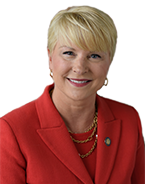Addressing the Drastic Need to Improve Employment Opportunities for Individuals with Disabilities
An Op-Ed from Assemblywoman Mary Beth Walsh (R, C-Ballston)
Nationwide, the month of October has been designated as “National Disability Employment Awareness Month.” In New York, it is estimated that only 30% of individuals with intellectual and/or developmental disabilities (IDD) are employed – leaving about 70% unemployed. What we need to acknowledge is that there are, without a doubt, thousands and thousands of those 70% who could be successfully employed, with proper training and job coaching.
Coming out of the COVID-19 pandemic, many businesses are finding it extremely difficult to find employees, and there have been many reasons for this: insufficient wages or benefits, childcare issues and an overabundance of federal monetary support that created a disincentive to work. We may not all agree on what has created and exacerbated our current labor shortage, but what we should recognize is that individuals with IDD are a willing and able, yet untapped and underutilized workforce.
At a recent joint hearing of the Assembly Committees on Labor and People with Disabilities and Subcommittee on Employment Opportunities for People with Disabilities, more than 60 panelists identified and discussed several barriers that prevent more meaningful employment of individuals with IDD. Below I’ve highlighted a few of these barriers, along with successful models that could help address the multi-faceted problem at hand.
People with IDD have a wide range of skills and abilities, so it only makes sense to develop a corresponding wide range of opportunities. Depending on ability, individuals might work in the public sector or in private industry; full time or part time; at various rates of pay; with or without the support of a direct service professional (DSP) job coach.
In the public sector, we must create an aspirational hiring target number, and we must support and enforce the Preferred Source Program (PSP) (Article 11, Section 162 of the Special Finance Law). In the private sector, we must show local businesses, large and small, of the benefits to them, to their workplace culture, and to their bottom lines, to hiring individuals with IDD.Either way, you will never meet a group of employees happier or prouder to come to work and if business owners were more aware of this, they might be open to considering this alternative.
At Golub Corporation (Price Chopper/Market 32), they host “Hiring AdvantEdge,” a one-day program for interested individuals as part of its equity and inclusion program. The one-day program includes resume writing and interviewing advice, a tour of the store or warehouse to show first-hand the job opportunities, and a few inspirational words from others who have gotten jobs with the company. Completion of the 1-day program is their “ticket” to a job interview.
Local community colleges are also essential to helping businesses fill jobs which require more skills training than a high school diploma, but less than a 4-year college degree (commonly referred to as the “middle skills gap”). Recently, I learned about an innovative concept at Hudson Valley Community College called “The Uniquely Abled Academy”, a certificate program designed to train individuals with high-functioning autism for high performing jobs as CNC (Computer Numerical Control) machinists. While still in the planning stages, it is an exciting and innovative concept that should be widely supported.
Additionally, our schools and unions must also have a seat at the table. Unions can provide valuable apprenticeship programs and on-the-job training. Schools have the funding and are already charged with planning with students and their families before the age of 21. The goal should be to ensure that any student leaving public education leaves with a good job.
At the federal and state level, there is also much to be done.
Direct Support Professionals (DSPs) are woefully underpaid for the work they do. A DSP could be the person who helps an individual get up and going in the morning so they can get to work or the job coach who helps a person with IDD to be successful in the workplace. DSPs need to receive a predictable, recurring rate of pay commensurate with the critically important work that they do.
We need to ensure that anyone who wants to work, can. This means that the current disincentive known as the “benefits cliff” is addressed. If a person with IDD will lose their medical insurance or their disability benefits by working, they face a difficult choice to work anyway, or to stay on the sidelines. We need to make sure that people with IDD can do both.
The complexities of obtaining a job continue for those who may not drive or have reliable transportation, meaning even if they were to be successful in finding employment, the lack of transportation could prevent them from getting there. Fortunately, there are organizations like CDTA working to improve travel options for individuals throughout the Capital Region and I will continue to collaborate with them to advocate for this population and potential workforce.
At the state level, we are mired in red tape. We have several different agencies tasked with helping individuals with IDD.This can create challenges in inter-agency communication, duplication of efforts, and a lack of transparency for New Yorkers seeking to access programs.In order to demystify and streamline the delivery of information and services to the IDD community, we need to establish a clearing house of information that addresses each individual’s needs at a case-by-case basis.
Unfortunately, over several years these issues have not received the attention they deserve at the state level, and according to many who spoke at the Assembly hearing, the system teeters on the edge of collapse. As with so many other things, COVID-19 has exposed the cracks in an already fragile system. As we approach our 2022 legislative session, we legislators must do a better job to raise awareness, create, and support real solutions to these serious deficiencies.
There is so much more to be done, but any journey starts with the first step.
